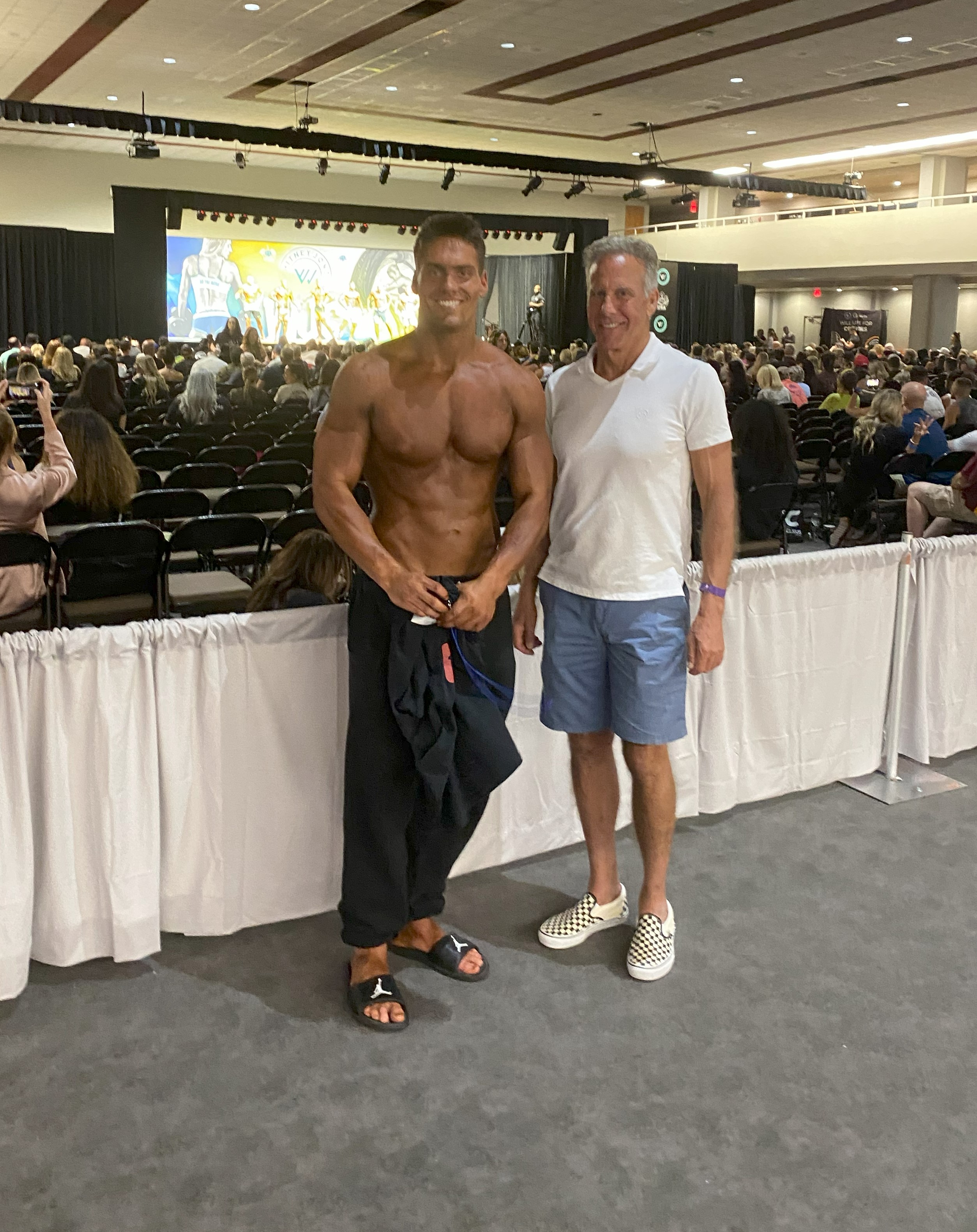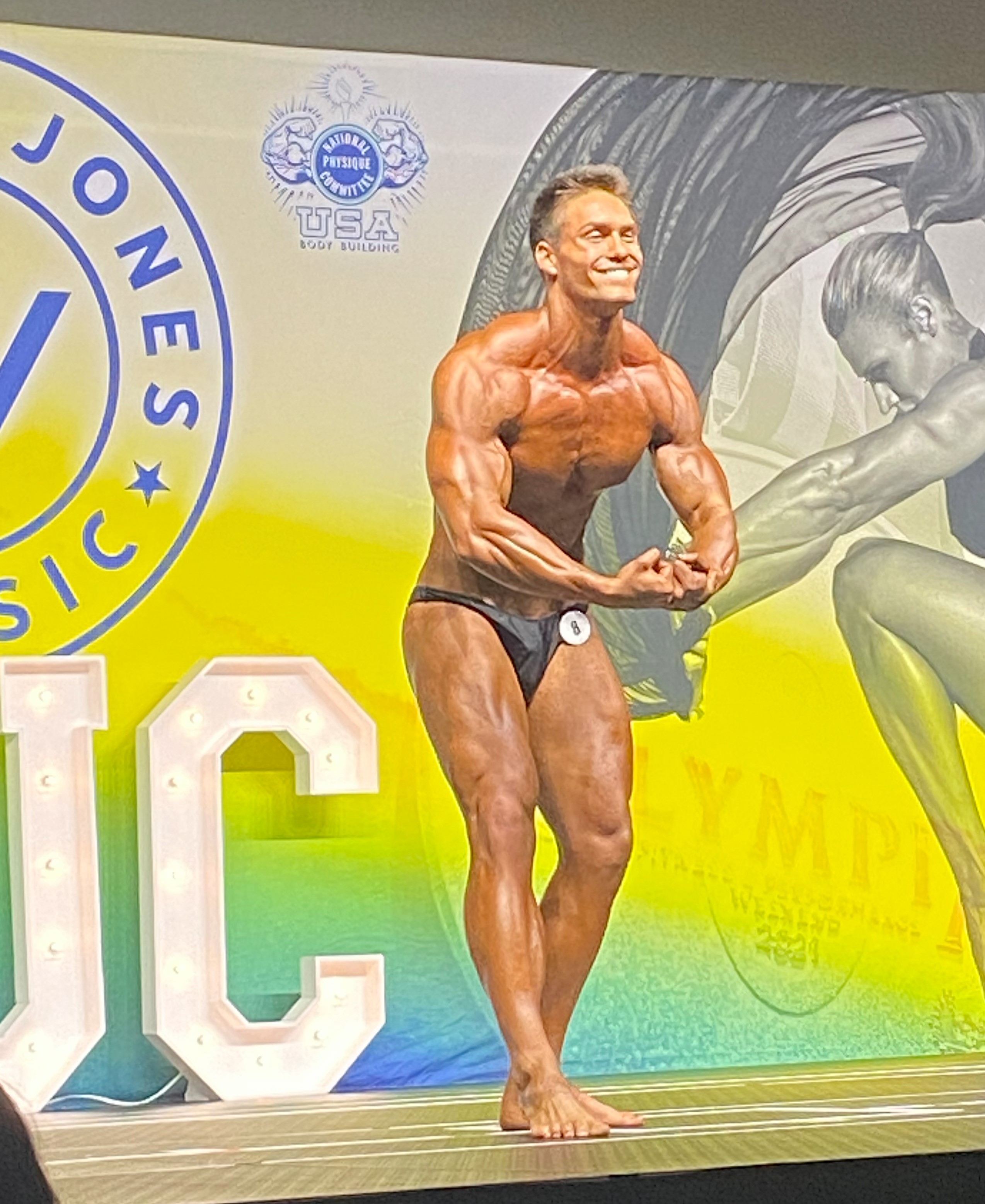Build muscle for longevity. Use a Food Tracking App.
Oct 09, 2023"You can't manage what you can't measure."
- Peter Drucker
Most guys I know want to:
- Build muscle
- Get leaner
- Or both
Yes, we want to look good.
But building muscle is about more than looks.
It's about reducing mortality risk and longevity. Especially after 50.
Building muscle boosts metabolism, reduces cognitive decline, improves heart health, lowers risk of falling, strengthens bones, reduces belly fat, boosts your mood, improves your sex life, makes you stronger, and I could go on but I'll stop there.
There are only two things you can control to build muscle and get leaner:
- Output – What you PUT OUT in exercise (strength training, walking, swimming, etc.)
- Input – What you PUT IN your body (protein, carbs, fat, calories, etc.)
For Output – Most guys who exercise, measure activities such as:
- Miles ran, minutes walked, stairs climbed
- Laps in the pool
- Reps and sets in the gym
This is good. I measure my exercises as well. I actually record my workouts in my Weekly Tracker, which you can download from my website for free by requesting access to my Resources page here. I'll have more to say about exercise in coming weeks.
For Input – This is where things fall apart. I know very few guys who measure consumption of:
- Grams of Protein
- Grams of Carbohydrates
- Grams of Fat
- Calories
This is bad. Building muscle and getting leaner are pretty much only dreams if you don’t know what you are consuming. If you don’t measure it, you can’t manage it.
It's not complicated. To build muscle and get leaner:
- Consume more Protein
- Consume fewer Calories/Carbohydrates
- Increase weight training a lot. Probably a lot more than you think.
The easy part is knowing what to do; the hard part is doing them.
Again, most guys I know would ideally like to build muscle, get leaner, or both. That is, they want to build their body. And to build your body you need a bodybuilder mindset.
Let me give you an extreme example.
Meet Luke Pavlina
Yesterday, I saw my nephew, Luke, compete in his first Bodybuilding competition. It was in Arizona at the 2023 NPC Whitney Jones Classic/NPC Arizona State Championships. Being a serious bodybuilder is a lot of work.
Luke is 20 years old. He’s a big dude and a great kid.
Here are pictures from yesterday: Luke and me, and Luke on stage:


In 1969, when I was 10 years old, Luke's dad (my big brother, Pat) started taking me to the gym to pump iron. I was amazed by Pat's knowledge of bodybuilding and recall all the muscle magazines he read. His enthusiasm was contagious.
Those early years in California is where I first learned about weightlifting. Everything I learned came from Pat; and he was inspired by Arnold Schwarzenegger, Lou Ferrigno, Franco Columbu, and other bodybuilders at Gold's Gym Venice. The rest is history.
Luke was fortunate to have a dad who had spent decades learning about weightlifting.
I love talking to Luke about his program. Granted, it’s extreme. But buried in the details are basic truths about how to build muscle and get leaner.
He and I talk about his training program:
- Output – Which exercises is he doing?
- Input – What is included in his meal plan?
Here are Luke’s meal plans in summary:
The Amounts for Protein, Carbs, and Fat are in grams:

Luke has two meal plans.
The Bulking Plan:
- This lasts for a year or longer
- The objective is to gain weight and build muscle
- By the end of this phase his weight was 260 lbs.
The Cutting Plan:
- This lasts for a couple months before a competition
- The objective is to lose weight and fat, get leaner, and to get "ripped"
- By the end of this phase (yesterday), his weight was 225 lbs.
Look closely at the box. Notice that daily Calories dropped from 4,500 to 3,000 and daily Carbs dropped from 200 grams to 50 grams.
Why does he cut Calories and Carbs so drastically? Because that is how he gets lean fast while maintaining muscle mass. He went from 260 lbs. to 225 lbs. over 12 weeks. This is normal for bodybuilders.
I use this example to illustrate how fast a human body can become leaner by a drastic cut in Calories and Carbs, while consuming the same amount of Protein to maintain muscle mass. This is what bodybuilders do.
There are many variations on how to do this, but the message is the same. To build muscle and get leaner, we need to measure what we consume.
To keep track of what Luke consumes, he uses a food tracking app. Specifically, he uses this app: Cronometer
And in case you are wondering, Luke has built his body naturally. No steroids.
Why don’t most guys measure what they eat?
- They are not aware of the extreme connection between what they eat and how they look
- The thought of measuring food intake has never really crossed their mind
- It’s work to learn how to use a food tracking app
- It’s not considered manly to count calories
- They are afraid to see how much crap they eat
We know very little about nutrition
“There is so much ideological bickering and utter bullshit out there” as it relates to nutrition and diets.
-Peter Attia, MD, Outlive
- I agree with Dr. Attia. So much bullshit.
- I think people overthink diets and nutrition
- They make it a lot harder than it needs to be
- The science of nutrition is in its infancy
- Epidemiological “studies” are great for headlines but exaggerate all kinds of claims
- Clinical trials are often sketchy, with lame conclusions
- This presents an obvious opportunity for self-proclaimed experts, nutrition gurus
- There are over 60,000 diet books on Amazon (I just checked); not to mention Twitter
- Zealous diet advocates promote extremism like religion: paleo, keto, low-carb, high-fat, fasting
- Just look at the extent of obesity and metabolic dysfunction today to see the confusion
- There's no such thing as one perfect diet for everyone. It should be highly personalized.
- Food molecules interact with our bodies in unique ways. We all react differently to nutrition.
- Doctors typically don’t ask about diet or nutrition. For the most part, they don’t know what to ask. It's not part of their training.
- The word “diet” is inaccurate, as if there's one best way. Nutrition is a better word. We need to look closely at what we consume. It’s science, not emotion.
- Nutrition means focusing on Protein, Carbs, Fat, Fiber, Sugar, etc. Not this or that diet.
A friend and I went to dinner recently after his 16-hours of fasting. He wants to build muscle and get leaner. He was starving. When the breadbasket arrived, he downed 3 dinner rolls, and butter, in about 60 seconds.
In the box below, I'm comparing his dinner rolls (bread) to a better nutritional choice (steak) that supports building muscle and getting leaner.
The Amounts for Protein, Carbs, and Fat are in grams:

Bravo. He heroically starved himself for 16 hours. There's only one problem. He moved himself further away from his goal of building muscle and getting leaner. He did the opposite of what his body needed. He ate mostly Carbs and very little Protein.
If I were my friend, I would not bother with the gym. There will be no muscle growth without adequate Protein. Period.
Why is food tracking important?
- If you can measure it, you can manage it.
- You hold yourself accountable and receive immediate feedback about what you consume
- Knowing the nutritional content of what you eat is as important as what you do in the gym
- It helps you be more mindful about what you consume
- Subconsciously we ignore the quality or quantity of the food and nutrients we consume because we know it’s not consistent with building muscle and getting lean.
The rocket science of weight loss:
- Calorie input < calorie output = weight loss
- Calorie input > calorie output = weight gain
- Calorie input = what you put in your mouth
- Calorie output = what you burn metabolically and via exercise
- But this is for weight loss and says nothing about building muscle
To get started with a Food Tracking app:
Create an account and profile, just like all the other apps you have
It takes around 5 minutes per day after you set up your goals
Set up your goals:
o Current weight, goal weight
o Weekly weight loss goal
o Exercise activity level (not active, active, etc.)
o Workouts/Week
o Minutes/Workout
o There are more settings besides those
The app will calculate your daily Default Goals for Calories, Protein, Carbs, Fat, etc.
In my case, here are my Default Goals using the free version of MyFitnessPal:
- Calories - 2,500
- Protein - 130 grams
- Carbohydrates - 300 grams
- Fat - 90 grams
- You can customize the goals in the paid version of the app.
If I want to gain muscle and get leaner:
If I want to gain muscle and get leaner, I have to tweak my Default Goals. It’s amazing how well this works. Even at my age, 64 years old. It was the same formula in high school.
I review my daily Default Goals then tweak it as follows:
o I increase Protein so it’s almost one-to-one with my body weight
o My body weight is 183 lbs, so I’ll eat close 183 grams of Protein
o I decrease my Carbs to closer to 150 grams, half the Default Goal
o Fat usually rises a bit but that’s okay, that’s from more Protein (meat, fish, nuts)
o Importantly, I hit the gym a lot harder than normal. I go to the point of failure in most of my sets. I like the feeling of sore muscles the day after a hard workout, especially with a new weight routine (more on strength training later).
The Amounts for Protein, Carbs, and Fat are in grams:

Focus on the box in the middle:
If I want more muscle and become leaner:
o I need a lot more Protein
o I cut Carbs in half
o Fat goes up a little
o I don’t change Calories as I feel best at around 2,500 per day
This has been my program for the last few months. I'm pleased with my results. My muscle mass increased, my percent body fat decreased (to 10%), and my body weight is constant at 183. I'm stronger and my energy level is great.
Conclusion
I’m not recommending you go out and start training like a bodybuilder by any stretch. Frankly, many bodybuilders would be the first to tell you it could be unhealthy to train as extremely as they do. What I am suggesting is that if you are serious about building muscle, getting leaner, or both, you need to strictly measure what you put in your mouth. A food tracking app makes this a lot easier.
Here are some useful links:
MyFitnessPal app: link
Cronometer app: link
Calorie Calculator: link
Thank you for reading!
Be well,
Peter Pavlina


